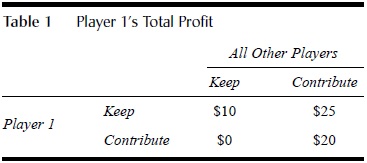Public Goods Dilemma Definition
 Public goods dilemma refers to a real-world decision whereby the outcome for any individual depends on the decisions of all involved parties. More specifically, these dilemmas are decisions in which individuals must weigh personal interests against the collective interest, which is typically a communal resource, a public good.
Public goods dilemma refers to a real-world decision whereby the outcome for any individual depends on the decisions of all involved parties. More specifically, these dilemmas are decisions in which individuals must weigh personal interests against the collective interest, which is typically a communal resource, a public good.
Examples of Public Goods Dilemmas
Real-world public goods dilemmas are quite common. For example, the existence of public radio stations is based on listener donations, but any one individual can save money by listening without contributing. Voting, actions by the United Nations, and many environmental problems are all examples of public goods dilemmas.
Academic Writing, Editing, Proofreading, And Problem Solving Services
Get 10% OFF with 24START discount code
One of the original public goods dilemmas is Garrett Hardin’s “Tragedy of the Commons.” In his example, a community uses a common pasture to graze sheep. As long as each rancher uses the pasture for a small number of sheep, the pasture provides plenty of grazing. However, because each rancher sees the logic in adding a few more sheep (a large benefit for each rancher, only minor impact on the pasture), soon the pasture is well beyond its capacity and unusable by all.
Empirical Study of Public Goods Dilemma
Public goods games are used to study these dilemmas in the laboratory. In one version, players are given some amount of money either to keep for themselves, or contribute to a shared pool. Typically, any contributions to the shared pool are multiplied to reflect the shared benefit of such contributions. The total amount that a player receives is the sum of (a) the amount that the player kept for himself or herself, and (b) that player’s share of the shared pool.
By varying the specifics of these games, much has been learned about how people make public goods decisions. For example, punishments for noncontributors tend to increase contributions. Anonymous players tend not to contribute, whereas players who know each other are more likely to contribute. Similarly, a sense of belonging to a team tends to increase contributions, especially when one’s team is competing against another team in a different game.

References:
- Baron, J. (2000). Thinking and deciding (3rd ed.). New York: Cambridge University Press.
- Rapoport, A. (1987). Research paradigms and expected utility models for the provision of step-level public goods. Psychological Review, 94, 74-83.